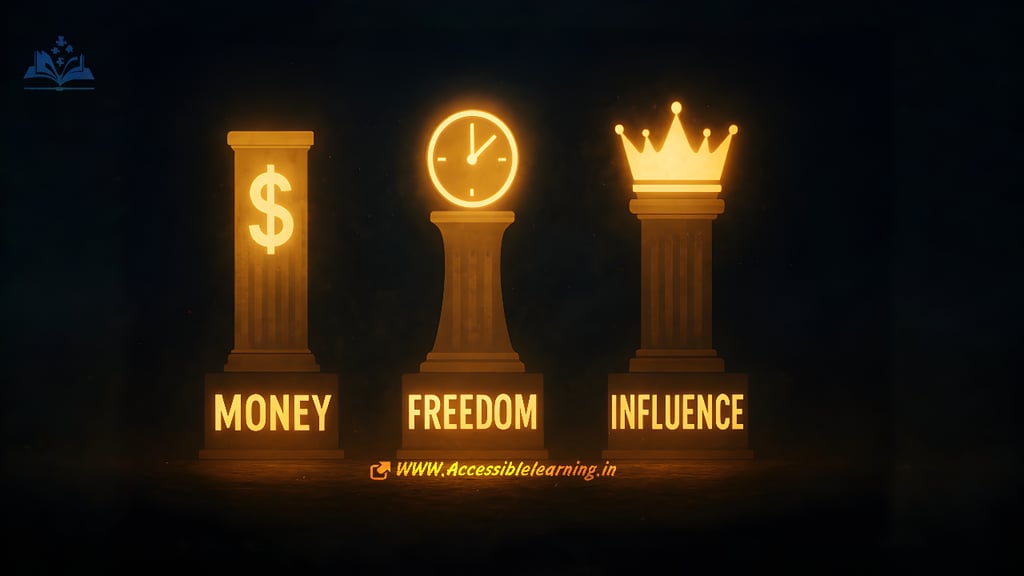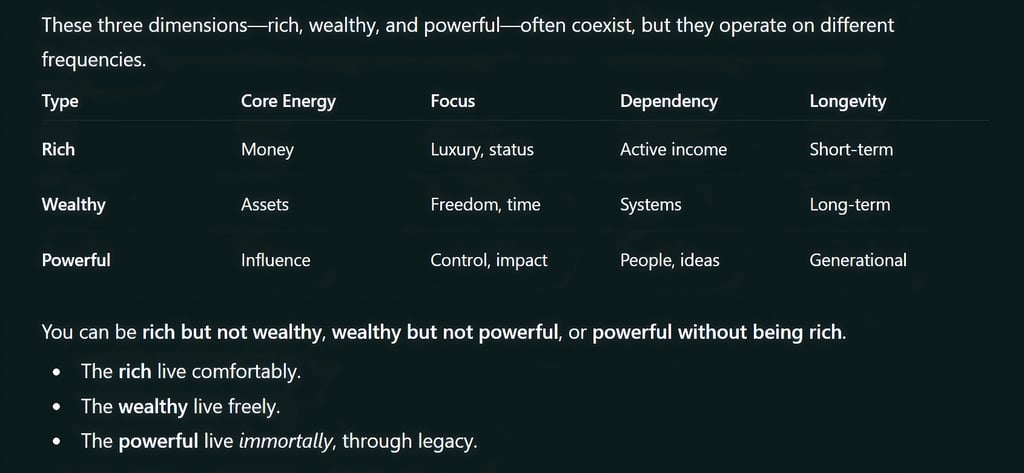
Rich vs Wealthy vs Powerful: The Real Difference That Defines True Success
Understanding the difference between being rich, wealthy, and powerful goes far beyond money. While riches bring luxury, wealth brings freedom, and power brings influence. This in-depth guide explores how these three forces shape human ambition, social status, and legacy. Discover the psychology, mindset, and evolution behind financial success—and learn what truly defines greatness in today’s world.
ENTREPRENEUR/BUSINESSMANSTOCK MARKETWEALTHY FAMILYBANKING/CASH-FLOW
Sachin K Chaurasiya
10/19/20256 min read


The True Hierarchy of Success
Many people dream of becoming rich, yet few understand the deeper spectrum of success that goes beyond money. The world often glorifies riches—luxury cars, grand mansions, expensive watches—but richness is only the surface.
There are levels above it: wealth and power. While the rich control resources, the wealthy control systems, and the powerful control people and narratives.
To truly grow, we must understand how these layers of success differ—not just in money, but in mindset, influence, and purpose.
The Rich: The Illusion of Financial Abundance
Being rich is primarily about earning a lot and spending a lot.
Rich people live in the spotlight—they enjoy their income and display success visibly. They might have the most luxurious lifestyles, but their comfort depends on a steady cash flow.
The rich often measure life through material possessions and social validation—cars, clothes, parties, or fame. Yet, behind this glitter often lies anxiety: What happens if it stops?
Core Traits of the Rich
High, often unstable income
Dependent on active work or fame
Focused on lifestyle and appearance
Often lack long-term security
Example: Many celebrities, entertainers, or entrepreneurs experience sudden wealth but lose it due to poor management or excessive spending. They are rich in the moment—but not financially free.
Being rich is a stage of comfort, but not necessarily one of control.
The Wealthy: Freedom, Security, & Time Ownership
Wealth isn’t measured in cash—it’s measured in time.
A wealthy person can maintain their lifestyle for decades without working actively. Their assets generate steady income—real estate, investments, royalties, or businesses that run independently.
Where the rich focus on spending, the wealthy focus on preserving and multiplying. They understand money as energy that flows through systems—not just as paper or digits.
Core Traits of the Wealthy
Own assets that generate passive income
Prioritize time freedom over luxury display
Think generationally, not monthly
Value control, not chaos
Example: Warren Buffett and Ray Dalio exemplify true wealth—they don’t chase trends; they build systems that outlive them.
The wealthy are financially secure because they use money to buy time, peace, and choices.
The Powerful: The Art of Influence and Control
Power transcends wealth. It is not merely having money—it’s the ability to shape systems, economies, opinions, and destinies.
Powerful people influence the flow of money itself. They may or may not be billionaires, but they possess the strategic influence to move people, markets, and nations.
True power doesn’t always wear a crown—it can be political, intellectual, technological, or emotional.
Core Traits of the Powerful
Influence people, systems, and decisions
Command trust or fear
Possess vision beyond personal gain
Use strategy, not speed
Examples:
Nelson Mandela was powerful without immense wealth; his influence changed nations.
Elon Musk merges wealth with power, shaping industries like energy and space.
Oprah Winfrey uses media power to guide culture and emotion.
Power isn’t about domination—it’s about direction. It decides what happens next.



The Hidden Layer: Mindset, Control, and Fear
The deeper difference lies not in external possessions but in internal psychology.
The Rich Mindset
Operates from ego and validation.
Desires recognition.
Often seeks happiness through external approval.
The Wealthy Mindset
Operates from freedom and security.
Desires independence and peace.
Values silence, time, and privacy over fame.
The Powerful Mindset
Operates from strategy and vision.
Desires change, not comfort.
Sees control as a tool for purpose, not pleasure.
In essence, the rich chase, the wealthy plan, and the powerful design.
The Social Impact: Who Shapes Society
The Rich entertain and inspire. They shape culture through glamour and lifestyle.
The Wealthy stabilize economies. They build companies, fund innovation, and sustain growth.
The Powerful direct history. They influence governments, ideologies, and entire generations.
Each has a role—but only the powerful redefine the rules.
The Modern Evolution of Power
In the past, power belonged to kings, landowners, and armies.
In the 20th century, it shifted to industrialists and financiers.
Today, in the digital era, it belongs to those who control information and attention.
Modern power lies not in gold, but in data, algorithms, and reach.
Tech giants control communication.
Media moguls control perception.
Political and social influencers control belief systems.
We’re living in an age where attention is the new currency, and those who command it are the new emperors.
The Path of Transformation: From Rich → Wealthy → Powerful
You can evolve from being rich to powerful through conscious transformation:
Step 1: Create Income (Be Rich)
Master a high-value skill or business.
Increase your earning power.
Learn to live below your means.
Step 2: Build Assets (Become Wealthy)
Invest in real estate, stocks, intellectual property, or scalable systems.
Automate income sources.
Focus on long-term financial literacy.
Step 3: Build Influence (Gain Power)
Develop leadership and communication skills.
Build networks of trust and impact.
Use wealth to create meaningful change.
Power comes when your ideas outlast your presence.
The Moral Compass: The Shadow Side of Power
There’s a thin line between influence and manipulation.
History is filled with powerful people who used their influence destructively—tyrants, dictators, and corporate exploiters.
True power requires ethics, wisdom, and purpose.
Without them, power corrupts; with them, power transforms.
The ultimate evolution isn’t to dominate—but to empower others.
The Spiritual Perspective: The Inner Wealth
Even beyond power lies something higher: Inner Wealth.
It’s the kind of richness no economy can touch—self-awareness, peace, compassion, and purpose.
The rich seek pleasure.
The wealthy seek freedom.
The powerful seek legacy.
But the awakened seek meaning.
When you reach that state, you realize that money and power are tools—not masters.
Understanding the Real Hierarchy
To summarize:
Being rich is about what you earn.
Being wealthy is about what you own.
Being powerful is about what you control.
Being fulfilled is about who you become.
The richest man can lose everything overnight.
The wealthiest can preserve his empire for generations.
The powerful can influence the course of history.
But the one who unites wisdom, wealth, and purpose creates something greater than all three: legacy.

FAQs
Q: What is the main difference between being rich and being wealthy?
Being rich means earning or possessing a large amount of money in the short term, often tied to active work or fame. Being wealthy, however, means having financial independence—your assets generate income even when you stop working. Wealth gives freedom; riches give comfort.
Q: Can someone be powerful without being rich or wealthy?
Yes. Many leaders, revolutionaries, and spiritual figures were powerful without material wealth. True power comes from influence, not possessions. It’s the ability to shape people’s beliefs, actions, or emotions—something money alone cannot buy.
Q: Is wealth necessary to gain power?
Wealth can create opportunities for power, but it’s not a guarantee. Money builds access, while character and vision build influence. Power rooted in wisdom lasts longer than power rooted in wealth.
Q: Which is better: being rich, wealthy, or powerful?
That depends on your life goals.
If you seek luxury, be rich.
If you seek freedom, be wealthy.
If you seek impact, be powerful.
The highest achievement, however, is balance—having wealth and using it with wisdom to create positive power.
Q: Can a person transition from being rich to powerful?
Absolutely. Many business figures and creators started by being rich, then used their wealth to build influence. The key is strategic thinking and contribution—investing not just in assets, but in people and purpose.
Q: How do the rich, wealthy, and powerful differ in mindset?
The rich think in earnings.
The wealthy think in investments.
The powerful think in influence.
Each operates on a different level of awareness and control.
Q: What’s the most dangerous part of being powerful?
Power without moral grounding becomes destructive. When influence is used for self-interest rather than shared growth, it leads to corruption and downfall. The strongest power is that which uplifts others, not dominates them.
Q: Is it possible to be all three—rich, wealthy, and powerful?
Yes, but it requires evolution. One must first earn money (rich), then build systems (wealthy), and finally lead with influence (powerful). This journey is less about accumulation and more about transformation.
Interesting Facts
Over 70% of self-made millionaires consider “time freedom” as their top measure of wealth—not money itself.
Most world leaders aren’t among the richest individuals, but their decisions control trillions of dollars in global trade.
Roughly 60% of lottery winners lose their fortune within five years, showing that wealth without mindset easily disappears.
Studies in behavioral finance show that wealthy individuals often think in decades, while rich individuals think in months.
True power today lies in attention—social media influencers and tech companies control modern narratives more than politicians once did.
The world’s richest families (like the Rockefellers and Rothschilds) built generational systems—shifting from riches to legacy wealth.
Power grows from perception. Those who can shape stories, culture, or data now hold the same control once reserved for empires.
Original Quotes (By AL)
✨ “The rich count money; the wealthy count time; the powerful count minds.”
✨ “Richness buys things, wealth buys freedom, and power buys tomorrow.”
✨ “Money can fill your house; wealth can build your home; power can move the world.”
✨ “To be rich is to live well. To be wealthy is to live free. To be powerful is to live remembered.”
✨ “The richest person may die broke, but the powerful one never dies—their influence echoes forever.”
✨ “True power begins where the ego ends—when influence serves others, not self.”
✨ “Richness fades with markets; wealth grows with wisdom; power lasts with purpose.”
✨ “You can measure riches in currency, wealth in time, and power in legacy.”
✨ “A wise soul uses money as a servant, wealth as a shield, and power as a voice.”
✨ “Those who chase money may win a race; those who build power change the course.”
Subscribe To Our Newsletter
All © Copyright reserved by Accessible-Learning Hub
| Terms & Conditions
Knowledge is power. Learn with Us. 📚


